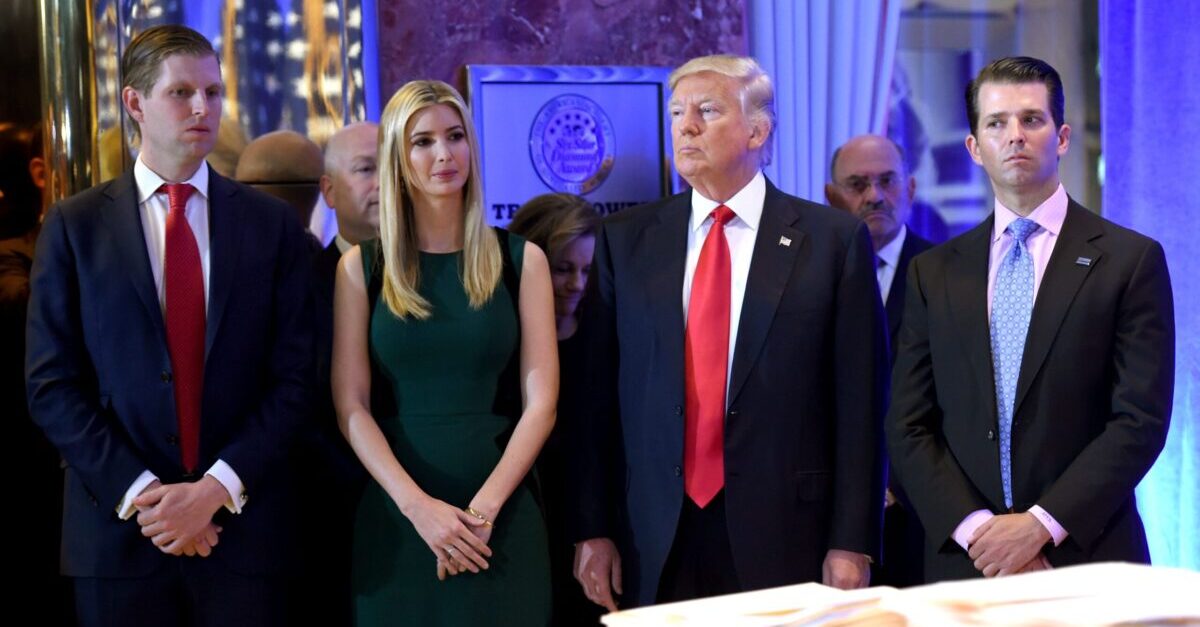
UPDATE—Feb. 17 at 3:26 p.m.: Hours after the Thursday morning hearing, the judge ruled against former President Trump and his children, ordering them to appear for deposition within 21 days.
Heaping scorn and insults on the Empire State’s top prosecutor, Donald Trump’s attorney argued in court on Thursday that New York Attorney General Letitia James (D) is going after her client “probably because he can win again in ’24.”
Throughout the attorney general’s probe, Trump and his family have claimed that they are being targeted for political prosecution based on James’s remarks on the campaign trail. James boasted about her record for suing Trump and called him an “illegitimate president.” Trump attorney Alina Habba said that James rhetorically convicted Trump of a crime for which he had never been charged when she said on the campaign trail: “We need to find out where he’s laundered money.”
“If you and I behaved as she behaved, we would be thrown before the ethics committee,” Habba told Manhattan Supreme Court Justice Arthur Engoron, referring to James.
Heaping scorn on James, a fired up Habba was repeatedly admonished by the judge and his clerk to stop interrupting them to try to tarnish the attorney general’s motives. Habba cast her client Trump as a victim of “viewpoint discrimination” and a man being persecuted because of his “protected class,” a phrase that legally refers to such categories as race, sex, religion, and color.
Engoron noted that that does not describe Trump, and he appeared to be skeptical of the broader arguments of selective prosecutions.
“How do we know that the motive is Donald Trump’s speech rather than his financial practices?” Engoron said, noting that Trump’s beliefs do not figure into some 600 documents in the docket.
Kevin Wallace, the attorney general’s acting chief for the investor protection bureau, quoted former Manhattan District Attorney Robert Morganthau’s line about Trump’s oft-described mentor Roy Cohn.
“A man is not immune from prosecution merely because a United States attorney happens not to like him,” Morganthau replied when Cohn complained about an alleged political vendetta.
For years, James has investigated the 45th president’s company, claiming—among other assertions—that it inflated the size of his Trump Tower triplex by nearly three times or tax benefits, did not assign a value to the Trump brand, and may have used “fraudulent or misleading” asset valuations on six properties to obtain economic benefits.
In their first hearing since accounting firm Mazars cut ties with him, Trump and his children cast the attorney general’s probe as politically motivated and tried to quash subpoenas and deposition demands as unfair.
Attorney Alan Futerfas, arguing for children Eric Trump, Ivanka Trump and Donald Trump, Jr., emphasized the stakes of what began as a civil probe are high.
“She has said unquestionably that she has a criminal investigation,” Futeras said, referring to James. “She has said it over and over.”
Futerfas noted that James contributed to former Manhattan District Attorney Cyrus Vance’s (D) criminal investigation that led to charges filed against the Trump Organization and its former chief financial officer Allen Weisselberg. That case and probe is now under the control of Alvin Bragg (D), who was sworn into the post of Manhattan’s top prosecutor on New Year’s Day.
“I don’t say this, your honor,” Futerfas noted. “She says this. Ms. James says this.”
Calling this state of affairs “unprecedented,” Futerfas argued that the attorney general’s office is using the civil probe to circumvent the grand jury process.
“It’s never happened before,” Futerfas said. “We’ve never seen it happen.”
Engoron shot back that the Constitution already provides protection against his clients’ self-incrimination: the Fifth Amendment.
“Can’t they just refuse to answer?” Engoron said. “Isn’t that what Eric Trump did 500 times?”
Deposed shortly before the 2020 presidential election, Eric Trump indeed invoked his Fifth Amendment right against self-incrimination more than 500 times, according to an attorney general’s filing in January. Futerfas insists that this puts his clients at a disadvantage because asserting their constitutional rights in the criminal process can harm them in the civil process. In criminal law, refusing to answer law enforcement cannot be used against someone.
In the civil process, such a refusal can result in an “adverse inference” being drawn.
Trump’s other lawyer Ron Fischetti told the judge: “This is a unique case. This is the former president of the United States.”
If Trump’s answers in a deposition were made public in a filing, Fischetti noted: “It’ll be on the front page of every newspaper in the world.”
Fischetti signaled an appellate battle ahead if Engoron ruled against Trump and his children.
“If you decide that this subpoena cannot be quashed, please—I beg you, I implore you—give your decision but give us time to appeal,” Fischetti said.
Justice Engoron replied that he tries to give litigants the opportunity to appeal to the appellate division “before something bad happens.”
“I’m not infallible,” Engoron noted.
“Thank you, sir,” Fischetti replied.
Engoron said that he would announce his decision by 3 p.m. Eastern Time.
[Image via TIMOTHY A. CLARY/AFP via Getty Images]